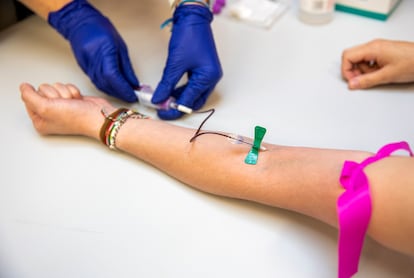What if a blood test could predict the risk of disease as we age?
A new study has concluded that a blood test can identify whether the body’s organs are aging faster than expected

We are as old as our birth certificate indicates. Whoever was born on January 12, 1950, is 75 today. This is indisputable. And it is known that age is the main risk factor for the development of a myriad of diseases — basically, that we are more likely to suffer from these ailments at 75 than at 35. However, it is the biological age of our body that really counts when it comes to the development of disease. This is because a person of 75 with extraordinary genetics and a healthy lifestyle will have a biological age of 65. Conversely, a 60-year-old might have a biological age of 80, which would multiply the risk of disease.
A study over 20 years of more than 6,000 British adults recently published in The Lancet has concluded that a quick and simple blood test has the potential to identify whether one or more organs in our body are aging faster than expected. In other words, it can determine whether any of our organs are biologically older than their chronological age and thus predict the risk of developing up to 45 age-related diseases, including cardiovascular disease, cancer and dementia.
“This study is the first to demonstrate that organ aging, indicated by distinctive plasma protein signatures, is associated with the risk of age-related diseases decades before their onset. Furthermore, organ-specific aging is linked to the development of multimorbidity,” explains Mika Kivimaki, professor at University College London’s Faculty of Brain Sciences and lead author of the research.
According to the results of the study, a heart that has aged faster than it should have is a significant predictor of an increased risk of cardiovascular disease, while people with accelerated lung aging are more prone to respiratory infections, chronic obstructive pulmonary disease (COPD), and lung cancer. However, the most outstanding feature of the study is its ability to show the interrelationship that exists between all the organs, so that accelerated aging of several of them significantly increases multimorbidity; and the aging of one can significantly affect others and increase the risk of diseases associated with them.
“The organs of the human body function as an integrated system, where accelerated aging of one organ often affects the others,” says Kivimaki. Surprising in that regard is the case of the kidneys. According to the study’s data, renal aging is associated with a wide range of diseases affecting not only the kidneys, but also the liver, pancreas, lungs and cardiovascular system. Conversely, the kidneys showed a higher susceptibility to damage from almost any major organ, so that more rapid aging of any other organ increased the risk of kidney disease.
According to the study, however, it is the aging of the immune system that has the greatest impact on our organs. In fact, the highest risk of dementia was found not in those participants whose brain aged faster, but in those with an impaired immune system. Studies have already shown that people who are more prone to serious infections also have a higher risk of dementia later in life. According to Consuelo Borrás, professor of physiology and principal investigator of the Research Group on Healthy Aging at the Valencian health research institute, INCLIVA, another explanation could be that the aging of the immune system is related to chronic inflammation, “a key factor in the development of neurodegenerative diseases.”
According to Manuel Collado, lead researcher of the Cellular Senescence, Cancer and Aging group at the Health Research Institute (IDIS) in Santiago de Compostela, the results of the study regarding the impact of the immune system on general aging also reinforce the conclusions reached by the Spanish scientist María Mittelbrunn, whose research has shown that the aging of the immune system leads to systemic aging of the whole organism.
“The implication of the aging of the immune system in the development of multiple age-related diseases seems to be gaining more and more weight,” says Collado. “In the end, the immune system effects the correct maintenance of many organ and tissue functions.” He believes that the relationship can also work in reverse. In other words, a rejuvenated immune system can perhaps have a positive effect on other organs and protect them from disease.
A fresh look at preventive medicine
According to Kivimaki, blood tests such as the one used in the study could soon play a “crucial role” in the prevention of numerous diseases and lead to more personalized medicine. “It is possible that the prevention of age-related diseases will start much earlier, prioritizing those who would benefit most and tailoring interventions to individual risk profiles,” he explains.
His opinion is shared by Collado, who sees the general application of these analyses “looking quite feasible and not very far off.” Collado believes that these analyses could also have other uses in the field of research, since they would make it easier to determine whether certain interventions are beneficial to specific patients. “For example, I cannot develop an effective treatment for neuronal aging if I don’t have a noninvasive (or minimally invasive) measure that allows me to see if the patients I am treating have distinct protein markers associated with neuronal aging,” he says.
Borrás’ optimism is more measured. Although she recognizes that the results are “promising” and that health policies “could focus on promoting regular and personalized check-ups, based on these analyses, to prevent the development of chronic diseases and improve quality of life,” she considers that the price of these tests and the advanced technology required to measure thousands of proteins in plasma “can limit their accessibility and widespread use in clinical practice.”
Sign up for our weekly newsletter to get more English-language news coverage from EL PAÍS USA Edition
Tu suscripción se está usando en otro dispositivo
¿Quieres añadir otro usuario a tu suscripción?
Si continúas leyendo en este dispositivo, no se podrá leer en el otro.
FlechaTu suscripción se está usando en otro dispositivo y solo puedes acceder a EL PAÍS desde un dispositivo a la vez.
Si quieres compartir tu cuenta, cambia tu suscripción a la modalidad Premium, así podrás añadir otro usuario. Cada uno accederá con su propia cuenta de email, lo que os permitirá personalizar vuestra experiencia en EL PAÍS.
¿Tienes una suscripción de empresa? Accede aquí para contratar más cuentas.
En el caso de no saber quién está usando tu cuenta, te recomendamos cambiar tu contraseña aquí.
Si decides continuar compartiendo tu cuenta, este mensaje se mostrará en tu dispositivo y en el de la otra persona que está usando tu cuenta de forma indefinida, afectando a tu experiencia de lectura. Puedes consultar aquí los términos y condiciones de la suscripción digital.









































